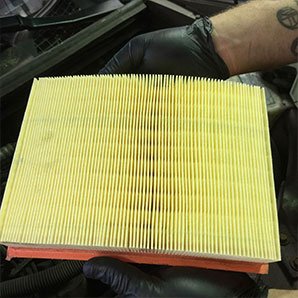Posted on 8/15/2018

Overheating What does it mean when your car is overheating? Ruh roh, your gauge is climbing to the dreaded red H. What is causing it and what can you do to fix it before it destroys your engine or causes some very expensive bill? Cars start to over heat as they reach 250 degrees. (Cars usually run at 195-220 degrees. Just to give you an idea.) Now keep in mind that the boiling point for your coolant is 250–260 degrees. Not much wiggle room, is there? Why is it important? Cooling your engine is very important. As it is with most machines, like your computer, keeping things cool as they do their job keeps every thing from breaking down due to heat and friction. Here are some things that happen to your car as the temperature climbs. Lowers your fuel combustion efficiency Causes corrosion Starts to heat and warp the metal in and around your engine. Causes the viscosity of the liquid in your engine to change to gunk (oil, Co ... read more
Posted on 7/20/2018

Air Filters Cars can have one or two air filters. One is for your engine and new models have one for your breathing air. Your cabin air filter is located usually behind your dash on the passenger side of the car. Your air filter for your engine is located at the top of your engine in its own housing. Why do air filters matter to you? Air filters prevent debris from getting into your engine and damaging it. It also helps your car to run. Cars work on a combustion system. You need a spark and you need oxygen. Having clean filters also increases fuel economy. Cabin air filters protect the breathing air from pollen and dirt. Signs something is wrong: You’ve notice a drop-in fuel efficacy Your car sounds funny Your car has a check engine light Reduction of horsepower Your car is misfiring Smell of gasoline Black smoke and/or flames coming out of the exhaust Below are examples of clean and dirty engine air filters
Posted on 7/20/2018
So, you’ve been with your car a little over a year now. Your mind is beginning to wonder about what’s in store for you down the road. Your thinking about what could go wrong, and if you’re going to make it thru the rough times ahead. If you are anything like me you’re going to want to know what to expect. Usually if you do your routine maintenance you shouldn't have many problems (aside from a flat tire here and there, that darn nail!) Important flushes: Brake fluid Flush- 30k or every 2 years Coolant Flush- 30k or every 5 years Transmission Flush= CVT every 2 years (type of fluid) or 15 k for Honda and Acura Power steering Flush- 75-100k Rear differential- 30k-60k Induction Cleaning- 30k (15k with a lot of city driving) Important parts replacements: Timing Belts-60k-105k Shocks-4-5 years Water pump- 100k if you have a good one, a cheap one can go at 30k, also should be changed with timing belt if its driven by timing belt ... read more
Posted on 6/5/2018
.JPG)
So, your car is making weird noises. Yikes! Now its time to find a mechanic. Going to the mechanic can be right up there with going to the dentist or the doctor. Yet it must be done. Even worse than going is not going. Picture it if you will… you’re driving down the Garden State Parkway and to your horror on top of the noise there’s now a rumbling and some shaking, and its not from you wiggling and moving to the beat. So, you pull off to the side of highway that cars travel down at high speed. Terrified of going on you call a towing company, but they are at least 3 hours out and you’re late for work. This usually ranks as a bad day. The best way to avoid bad days caused by car troubles? Have your car looked at each season. The price and the headaches are way less if you just bite the bullet and go, like the dentist. Now how do you find a mechanic that you want to see four-ish times a year? I’m Lucky enough to have found my shop. So, I’ll give ... read more